The cellular and molecular mechanisms leading to immune protection against coccidiosis in chickens are complex and include multiple aspects of innate and adaptive immunity. Innate immunity is mediated by subpopulations of immune cells that recognize pathogen-associated molecular patterns. Adaptive immunity, which is important in conferring protection against secondary infections, involves subtypes of T and B lymphocytes that mediate antigen specific immune response. Experimental studies in coccidiosis in chickens now support the role of lymphocytes and their secreted products (Lillehoj et al. 2011)
 Eimeria parasites have a long and complex biological cycle with exogenous and endogenous phases that trigger the immune system of the host. These parasites that cause coccidiosis in chickens can produce substances (chemokines) than can inhibit the immune response.
Eimeria parasites have a long and complex biological cycle with exogenous and endogenous phases that trigger the immune system of the host. These parasites that cause coccidiosis in chickens can produce substances (chemokines) than can inhibit the immune response.
It is well-known that coccidiosis vaccines can generate a proper level of immunity but at HIPRA we worked on the hypothesis that if we were able to modulate the immune response in some way we would be able to generate a strong, fast and long lasting immunity (Dalloul et al. 2005).
In coccidiosis in chickens there are 2 types of immune response addressed by two types of cellular populations: those producing interleukins Th1 (IL-2 and IFN-gamma) and others that produce interleukins Th2 (IL-4 and IL-10). To enhance the control of the parasite through cytotoxicity mediated by antibodies it is very convenient to shift the immune response towards Th1without eliminating the synthesis of interleukins type Th2.
A Th1 immune response will improve the production of specific cells such as macrophages and Natural Killer cells (NK). Interleukins IL-2 and INF-gamma play an important role in this immune response. IL-2 is responsible for the evolution of the primary T-cells towards a Th1 response and IFN-gamma will allow a differentiation of the non-differentiated cells into macrophages and NK-Cells.
When a pathogen enters the bird, it is initially contained by physical barriers but if it is able to penetrate and successfully infect it, the innate immunity is going to take an active role. At this point in a primary infection, macrophages are very important. They will capture the pathogen, digest the proteins and present them. Together with macrophages, dendritic cells and B cells are specialized antigen presenting cells that will activate naïve T-cells. Antigen Presenting Cells in fact are seen as the link between innate and adaptive immunity. Once the adaptive immunity is created, this will provide a specific response that will eliminate the pathogen.
In the case of an intracellular pathogen, which is the case with Eimeria in coccidiosis in chickens, there will be an activation of IL-2 that will switch the response to a Th1 response. In the Th1 immune response, activated Cytotoxic T-cells (CTL) are able to detect infected cells and destroy them.
CTL will target schizonts and sexual stages of the parasite. This will produce IFN-gamma and activation of macrophages and NK cells. When this Th1 response is successful, the intestinal damage caused by the parasite stops and there is a dramatic decrease in the elimination of oocysts.
If, on the other hand, we have an extracellular pathogen, it is more convenient and effective to have antibodies against this pathogen. IL-4 will lead to a Th2 response. This is what the parasite wants because it is less effective; in fact, the Eimeria parasites have coded in their genome the right proteins to immune modulate the host to have this type of response. The B-cell response will increase IL-10 that will activate eosinophils, mast cells and basophils that are all important in an inflammatory process.
In the studies conducted by HIPRA we wanted to follow the production of Th1 cytokines (IL-2 and IFN-gamma) and Th2 cytokines (IL-4 and IL-10). In this way we could better understand all the mechanisms involved in this process and look for adjuvants that were able to modulate the immune response against coccidiosis in chickens.
REFERENCES:
- Dalloul RA, Lillehoj HS. ‘Recent advances in immunomodulation and vaccination strategies against coccidiosis’. Avian Dis. 2005 Mar; 49(1): 1-8.
- Lillehoj, H.S., Lee, S.H., Jang, S.I., Kim, D.K., Lee, K.W. ‘Recent progress in understanding host mucosal response to avian coccidiosis and development of alternative strategies to mitigate the use of antibiotics in animal production’. Korean J. Poult. Sci. 2011 38, 275-284.



